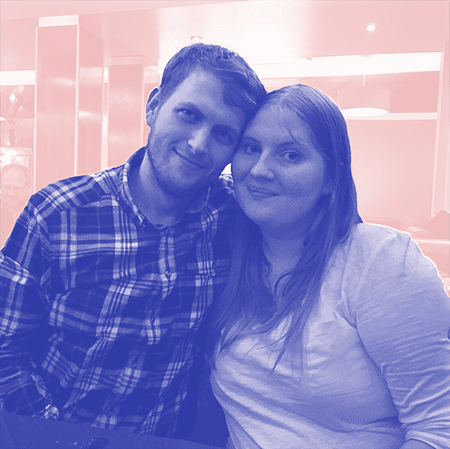Five burning questions
I was brainstorming some ideas with Gareth about what else he would like to discuss in connection with Autism, following on from our previous article. Simultaneously, we both said relationships. So here we are. We have asked for your questions on Twitter, and Gareth and I are going to discuss them.
We got slightly distracted talking about whether you can take a dog on roller coasters… In case you are interested, we are going to Alton Towers (Gareth has an obsession with amusement parks). Gareth made the good point that if you can take a dog skydiving, then why can’t you take them on a roller coaster? You can see how easily distracted he is!
But back to the matter at hand…
1
Some autistic people have a lot of issues with self-loathing. How do you deal with this as a couple?
Ruth: Well, for me the key is belief. At the beginning of the relationship, Gareth was going through an unstable period in his life, with a very low opinion of himself! Gareth was very withdrawn and unhappy, with an unhealthy dose of pessimism and zero confidence in himself or his abilities.
Communication from Gareth about his issues was really like getting blood out of a stone. In a desert. There is absolutely no quick fix for this. You are in for the long run! For a lot of people this can be exhausting, and you can feel like you are getting nowhere. Something inside me said to stick at this. My big influence in my life was my Nan who used to say “stick at it girl. don’t give up, because giving up means running away.” Well, I wasn’t going to give up on Gareth. He needed someone, and at first—I won’t lie—I didn’t know if we were going to be “together forever”, but I knew he needed a companion and some stability. I gave him space when he needed it, and we talked into the middle of the night if he needed to.
Over time him he opened up about his self-loathing, and this only made me love him more. He was showing his human side. This is the really important thing, and the thing I think helped massively: persistence. I believed that Gareth was a wonderful person. He is kind, considerate, intelligent, and funny. I needed Gareth to see this, and over time he started to see the qualities I see in him. It’s constant presence and reassurance that can slowly build up someone’s image of themselves again.
Gareth: That really is it. From my point of view, I hated myself. I’m still not the biggest fan four years down the line, but I have a lot more faith in myself these days, and less of the faux-arrogance when I was trying to lie to myself. Having someone who believes in me and encourages me even when I’m struggling, reassures me when I am getting frustrated, and will gently guide me when I am struggling to navigate life and human interaction—as opposed to putting me down—is the best thing that has ever happened to me.
Ruth believes in me when I don’t believe in myself, and sometimes, one person in the partnership believing is enough, provided they keep telling the other person.

2
How do you communicate when you need space, and normal communication is impaired?
Gareth: This is a big one, because when I am overstimulated—as I’m sure every person on the spectrum reading this will understand—it isn’t easy to say what you mean and remain polite. And a lot of the time “typical” responses to a person in distress actually make meltdowns/shutdowns worse. Then, when you snap or lash out, your partner gets upset and it causes arguments, which end up going round in circles. We went there. I’ve been downright horrible with Ruth before, though never physically violent, as I tend to injure myself more than others in meltdowns.
But to have a healthy, lasting relationship, this is a massive thing that needs to be addressed, and the need for space plays a key role here. What we have done—and do to this date—is have a discussion around whatever incident has happened, tell each other how what happened made us both feel, and try and work out what to do differently in the future.
One common stumbling block is my tone of voice when I’m frustrated. It is irrational, but it upsets Ruth, and I have to understand that, even though it makes no sense to ME that she gets upset by it, that doesn’t change the fact that it upsets her. So I am working on ways to calm myself, and, after discussing it with Ruth, she knows that if I walk off without saying anything, it is no slight on her; just me needing to calm down before we can have productive communication.
Ruth: Gareth is right; overstimulation causes him to come across as condescending and aggressive. There have been a few instances where he has been horrible and it has really upset me. At first, I didn’t understand what I had done to deserve this condescending tone of Gareth. I used to feel guilty for getting upset at him being unpleasant. Then I realised that, even though I am his carer, I am allowed to get upset. It’s a natural reaction.
I try to wait for Gareth to calm down a bit. Sometimes he rocks, and sometimes he tells me he needs space, so I go off and cry, or write my feelings down until he is ready to talk. I would get annoyed that I had to wait for when he is ready, but I understand now there is no point trying to communicate with him when he is rocking or needing space because it will go in one ear and out the other, and only frustrate him more. So I just wait, and then we discuss what he has done to upset me, or I have done to upset him. It really is patience and communication that get you through the difficult moments.
3
How do you both handle potentially self-injurious behaviour?
Ruth: At first I had no idea whether I should stop Gareth hitting himself or tapping his foot. I used to stop him hitting himself, until I realised this is a response to being overstimulated (stimming). I now allow Gareth to hit his head with hand. However, if it gets too hard, I do grab his wrists and say “Stop it.”
Usually, the hitting of himself isn’t that hard. There have been a few times where I have intervened. Once he was on the floor, hitting and banging his head on the floor, hitting himself, and flailing his arms and legs about. So I straddled him and grabbed his wrists to stop any continuous violence to himself. I stop the punching of walls as well, by putting my hands in front of where he is going to punch. The punching of walls has now stopped, because when he puts a hole in the wall, he has to fix it, so he knows there are consequences to his actions.
Gareth: That’s one of the areas where we still aren’t quite ‘there’ yet. Ruth is still processing that when I am overstimulated, I am not capable of processing all but the basest consequences. However, I retain enough basic function, which is essentially the first law of robotics “A robot may not injure a human being or, through inaction, allow a human being to come to harm” To wit, I retain enough function not to hurt anyone, but (“hurting”) objects are fair game.
Ruth: Ah, so it isn’t the wall you care about—you just don’t want to hurt me!
Gareth: You got it! See, communication! Also, I had to get the I, Robot quote in there!
The ability to stim—even if it looks painful—is good (it regulates me), but the fact that Ruth watches out and makes sure I don’t cause any damage is long-term good, even if I don’t like it at the time.
Important bit here: I DO NOT advocate Ruth’s approach if your partner isn’t capable of not hurting you. Your safety has to come first, and also, when your partner calms down, they’re going to feel guilty as hell, and that could trigger another episode. Instead, work with them when they are calm, and focus on how they would like you to handle the behaviour, such as calm voices, environmental change, or medication if necessary—but don’t put yourself at risk.
For me, if it’s bad, before restraining me, Ruth will turn the lights down and TV off, puts music on if it’s noisy outside and turns the heat off, and let the dog in if she’s outside. Our dog Scarlett is AMAZING with meltdowns. I mean, Ruth’s okay, but that dog… (I’m joking darling; you’re awesome too.)
Look at what precedes the self-injurious behaviour and try and manage that before it becomes too much.

4
Do your different outlooks ever make you feel emotionally estranged or disconnected from your partner?
Gareth: This is a really difficult question. I don’t know. I don’t really understand emotion as it’s portrayed. I constantly evaluate life, and Ruth checks all my boxes. I don’t love her for some arbitrary biochemical reason; I love her because… It’s all rational emotion—not just feelings.
Now if by emotionally estranged, you mean not being able to relate, then yes. Our brains are very different. Some of her mindsets and ideas are foreign to me, and no matter how hard I try, I cannot comprehend them, so I guess you could call that disconnect. I guess that probably happens in all relationships, but I don’t know.
The really important thing though is that we TRY. I’ll prod and poke and question and angle and mither about areas where we can’t connect, until I can form a rational construct for her viewpoint that I can kind of work with, because I actively want to have that connection—and hell, high water or brain chemistry damn well won’t stop me! So yes. Emotionally we don’t connect sometimes. But rationally we do. Normally over a heated discussion with three meltdowns, many tears on Ruth’s part, and seven cups of tea, but we get there!
Ruth: I disagree with you, Gareth. Yes, we think differently, and feel emotions differently. But in my eyes, there is no right or wrong way to feel emotions. There is no book out there explaining when you should be happy, and when you should be sad. Yes, I feel emotions differently, but I don’t feel disconnected from Gareth. I feel like we have our own special connection. That connection means a lot to me. I also don’t feel estranged. Actually, scrap that; I feel estranged when you watch a One Day International Cricket game, so that is my complaint. We are estranged over cricket. And even more so over test matches. Five days. Really, GARETH!
Gareth: You STILL ask who’s winning on day one of a test. Now that is grounds for estrangement!

5
How do you handle the anxiety of starting new relationships, and navigate the early stages?
Gareth: Bloody neurotypicals. She’s making me go out of routine (taking turns answering first). Good thing I love her! So when we first met, my self-loathing kinda helped with this. I thought no-one would really want me, so I was just seeing how things went. In a way, I had nothing to lose, and I was really lucky in that Ruth and I collided like two stars. We clicked and I didn’t have to go through the whole anxiety of asking her out and expecting a no.
Also—and she knows this—I hedged my bets before asking, and may have been a tad manipulative. Not in a bad way, but engineering situations so I could get a body language response that I understood, as opposed to subtle cues, which I don’t understand. The biggest example here was where I told her I was going to have to move down south within the next few weeks (not technically untrue, but you don’t really mention that kinda thing when dating apparently) and she grabbed my hand. That was a nice clear signal. We like! So don’t be nasty-manipulative, but if you can steer situations into where you can get signals you understand, that is one option.
As for the early stages. In an NT–ASD relationship, the learning curve is steep. Think ‘Dark Souls’ steep.[1]Is Dark Souls too hard? | c|net You have to—on both sides—go into it with a CONSCIOUS desire to listen and work TOGETHER. Know that the other person has faults. Know that they will royally f**k up sometimes. Know that your brains work fundamentally differently. And then work to understand each other. Forge connection despite your differences, not based on your commonalities, and TALK about problems. Talk until you understand. Don’t give up.
My grandparents had their diamond wedding anniversary recently. When asked how they have been happy for so long, they said:
Togetherness; we do everything together, we face
joy and adversity together, and work as a team.
Togetherness is really the keyword. For Ruth and I, we know our strengths and weaknesses and we work as a team. We’re fundamentally different in a lot of ways. But together we are a superstar!
Ruth: That is a good answer Gareth—and no, I am not being sarcastic. That really touched me! When we first met, I treated our dates like any other; they were dates, and I would just see how things go. It turned out things went very well, and we ended up together. I already sort of knew about the moving thing. I couldn’t tell if he meant it, or was seeing my reaction. I treated it as if it was genuine, and I grabbed hold of his hand and said “You can’t go” since then we have been together.
The massive learning curve for me was understanding what was going on. I had worked with children with autism, but never with adults. Yet I recognised some of Gareth’s autistic traits. I had to learn. I treated the whole learning thing as if I was getting to know someone—which I was—but beyond that, I was learning how his brain worked! With teamwork and talking to his occupational therapist, I learned how to live with autism. I am not going to sit here and say all that learning was easy, as it wasn’t. I am still learning to this day. But by working together through situations we become stronger. As Gareth said, togetherness is the key. And I wouldn’t have him any other way now!
Contact
So there we have it. Funnily enough, Gareth normally edits and cuts my articles down, yet this time he was the wordy one. Ha! Take that, Gareth!
If you like this article, please share it, and you can follow us on Twitter, Facebook or by email. With email, we promise never to sell your data or use it for anything other than delivering you fresh content from The Rolling Twenties. We hate spam with a passion so would never clog your inbox with it!
Any other questions, or anything you want to say? Let us know in the comments or on social media; we love communicating with our readers!
Disclaimer
We in no way recommend restraint unless trained and given express permission, please. 🙂
Comments
Let us know what you think!